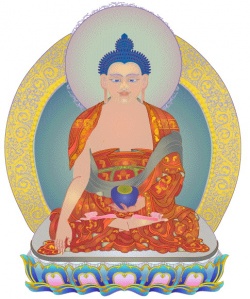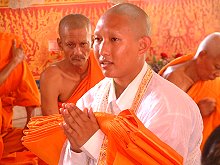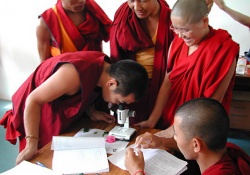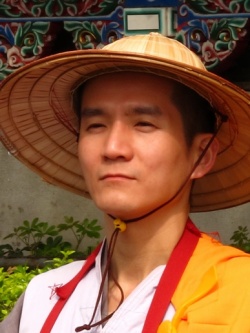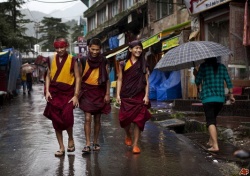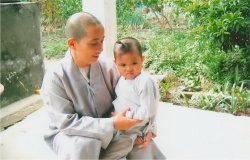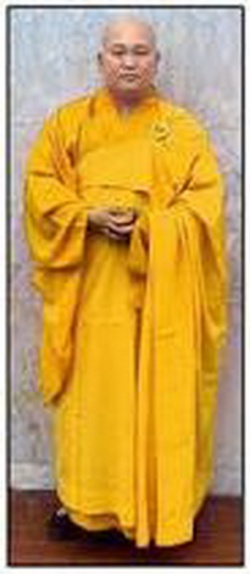Difference between revisions of "Uppalavaṇṇāsuttaṁ: The Discourse about Uppalavaṇṇā"
(Created page with "<nomobile>{{DisplayImages|1855|1965|2450|2509|2389|867|2833|2324}}</nomobile> {{Centre|<big><big>Uppalavaṇṇāsuttaṁ<br/> The Discourse about Uppalavaṇṇā </big><...") |
m (Text replacement - "hundred thousand" to "hundred thousand") |
||
| (One intermediate revision by one other user not shown) | |||
| Line 7: | Line 7: | ||
Thus I have heard: | Thus I have heard: | ||
| − | ekaṁ samayaṁ Bhagavā Sāvatthiyaṁ viharati | + | ekaṁ samayaṁ [[Bhagavā]] Sāvatthiyaṁ viharati |
| − | at one time the Gracious One was dwelling near Sāvatthī | + | at one time the Gracious One was dwelling near [[Sāvatthī]] |
| − | Jetavane Anāthapiṇḍikassa ārāme. | + | [[Jetavane]] Anāthapiṇḍikassa ārāme. |
| − | at Anāthapiṇḍika's grounds in Jeta's Wood. | + | at Anāthapiṇḍika's grounds in Jeta's [[Wood]]. |
| − | Atha kho Uppalavaṇṇā bhikkhunī, pubbaṇhasamayaṁ nivāsetvā, | + | Atha kho [[Uppalavaṇṇā]] [[bhikkhunī]], pubbaṇhasamayaṁ nivāsetvā, |
| − | Then the nun Uppalavaṇṇā, having dressed in the morning time, | + | Then the [[nun]] [[Uppalavaṇṇā]], having dressed in the morning time, |
pattacīvaram-ādāya, Sāvatthiṁ piṇḍāya pāvisi. | pattacīvaram-ādāya, Sāvatthiṁ piṇḍāya pāvisi. | ||
| − | after picking up her bowl and robe, was entering Sāvatthī for alms. | + | after picking up her [[bowl]] and robe, was entering [[Sāvatthī]] for [[alms]]. |
Sāvatthiyaṁ piṇḍāya caritvā, pacchābhattaṁ piṇḍapātapaṭikkantā, | Sāvatthiyaṁ piṇḍāya caritvā, pacchābhattaṁ piṇḍapātapaṭikkantā, | ||
| − | After walking for alms in Sāvatthī, and returning from the alms-round after the meal, | + | After walking for [[alms]] in [[Sāvatthī]], and returning from the [[alms-round]] after the meal, |
yena Andhavanaṁ tenupasaṅkami divāvihārāya, | yena Andhavanaṁ tenupasaṅkami divāvihārāya, | ||
| − | she approached the Blind Man's Wood to pass the day, | + | she approached the [[Blind]] Man's [[Wood]] to pass the day, |
Andhavanaṁ ajjhogahetvā, | Andhavanaṁ ajjhogahetvā, | ||
| − | and having entered Blind Man's Wood, | + | and having entered [[Blind]] Man's [[Wood]], |
aññatarasmiṁ Supupphitasālarukkhamūle aṭṭhāsi. | aññatarasmiṁ Supupphitasālarukkhamūle aṭṭhāsi. | ||
| − | she stood at the root of a Sāla tree in full flower. | + | she stood at the [[root]] of a [[Sāla]] [[tree]] in full [[flower]]. |
Atha kho Māro Pāpimā | Atha kho Māro Pāpimā | ||
| − | Then the Wicked Māra | + | Then the Wicked [[Māra]] |
Uppalavaṇṇāya bhikkhuniyā bhayaṁ chambhitattaṁ lomahaṁsaṁ uppādetukāmo, | Uppalavaṇṇāya bhikkhuniyā bhayaṁ chambhitattaṁ lomahaṁsaṁ uppādetukāmo, | ||
| − | desiring to give rise to fear, terror, and horror in the nun Uppalavaṇṇā, | + | [[desiring]] to give rise to {{Wiki|fear}}, {{Wiki|terror}}, and [[horror]] in the [[nun]] [[Uppalavaṇṇā]], |
| − | samādhimhā cāvetukāmo, yena Uppalavaṇṇā bhikkhunī tenupasaṅkami, | + | samādhimhā cāvetukāmo, yena [[Uppalavaṇṇā]] [[bhikkhunī]] tenupasaṅkami, |
| − | desiring to drive her out of concentration, approached the nun Uppalavaṇṇā, | + | [[desiring]] to drive her out of [[concentration]], approached the [[nun]] [[Uppalavaṇṇā]], |
| − | upasaṅkamitvā Uppalavaṇṇaṁ bhikkhuniṁ gāthāya ajjhabhāsi: | + | upasaṅkamitvā Uppalavaṇṇaṁ bhikkhuniṁ gāthāya [[ajjhabhāsi]]: |
| − | and after approaching he addressed the nun Uppalavaṇṇā with a verse: | + | and after approaching he addressed the [[nun]] [[Uppalavaṇṇā]] with a verse: |
| − | “Supupphitaggaṁ upagamma, bhikkhuni, | + | “Supupphitaggaṁ upagamma, [[bhikkhuni]], |
| − | “Approaching (a tree) blossoming from the top, <ref>{{Nolinking|Comm: supupphitaggan-ti aggato paṭṭhāya suṭṭhu pupphitaṁ Sālarukkhaṁ;}} blossoming from the top means from the top of the Sāla tree which was in full flower.</ref> nun, | + | “Approaching (a [[tree]]) blossoming from the top, <ref>{{Nolinking|Comm: supupphitaggan-ti aggato paṭṭhāya suṭṭhu pupphitaṁ Sālarukkhaṁ;}} blossoming from the top means from the top of the [[Sāla]] [[tree]] which was in full [[flower]].</ref> [[nun]], |
Ekā tuvaṁ tiṭṭhasi Sālamūle, | Ekā tuvaṁ tiṭṭhasi Sālamūle, | ||
| − | You stay alone at the root of the Sāla tree, | + | You stay alone at the [[root]] of the [[Sāla]] [[tree]], |
| − | Na catthi te dutiyā vaṇṇadhātu, | + | Na catthi te [[dutiyā]] vaṇṇadhātu, |
| − | You are second to none in your beautiful form, <ref>{{Nolinking|Comm: na catthi te dutiyā vaṇṇadhātū ti tava vaṇṇadhātusadisā dutiyā vaṇṇadhātu natthi, tayā sadisā aññā bhikkhunī natthī ti vadati;}} you are second to none in your beautiful form means there is no beauty the same as your beautiful form, there is no other nun the same as you, is what is said.</ref> | + | You are second to none in your beautiful [[form]], <ref>{{Nolinking|Comm: na catthi te dutiyā vaṇṇadhātū ti tava vaṇṇadhātusadisā dutiyā vaṇṇadhātu natthi, tayā sadisā aññā bhikkhunī natthī ti vadati;}} you are second to none in your beautiful [[form]] means there is no [[beauty]] the same as your beautiful [[form]], there is no other [[nun]] the same as you, is what is said.</ref> |
Bāle nă tvaṁ bhāyasi dhuttakānan?”-ti | Bāle nă tvaṁ bhāyasi dhuttakānan?”-ti | ||
| Line 60: | Line 60: | ||
Atha kho Uppalavaṇṇāya bhikkhuniyā etad-ahosi: | Atha kho Uppalavaṇṇāya bhikkhuniyā etad-ahosi: | ||
| − | Then it occurred to the nun Uppalavaṇṇā: | + | Then it occurred to the [[nun]] [[Uppalavaṇṇā]]: |
“Ko nu khvāyaṁ manusso vā amanusso vā gāthaṁ bhāsatī?” ti | “Ko nu khvāyaṁ manusso vā amanusso vā gāthaṁ bhāsatī?” ti | ||
| − | “Who is this, a human or a non-human, speaking this verse?” | + | “Who is this, a [[human]] or a {{Wiki|non-human}}, {{Wiki|speaking}} this verse?” |
Atha kho Uppalavaṇṇāya bhikkhuniyā etad-ahosi: | Atha kho Uppalavaṇṇāya bhikkhuniyā etad-ahosi: | ||
| − | Then it occurred to the nun Uppalavaṇṇā: | + | Then it occurred to the [[nun]] [[Uppalavaṇṇā]]: |
“Māro kho ayaṁ Pāpimā | “Māro kho ayaṁ Pāpimā | ||
| − | “This is the Wicked Māra | + | “This is the Wicked [[Māra]] |
mama bhayaṁ chambhitattaṁ lomahaṁsaṁ uppādetukāmo, | mama bhayaṁ chambhitattaṁ lomahaṁsaṁ uppādetukāmo, | ||
| − | desiring to give rise to fear, terror, and horror in me, | + | [[desiring]] to give rise to {{Wiki|fear}}, {{Wiki|terror}}, and [[horror]] in me, |
samādhimhā cāvetukāmo, gāthaṁ bhāsatī.” ti | samādhimhā cāvetukāmo, gāthaṁ bhāsatī.” ti | ||
| − | desiring to drive me out of concentration, who speaks this verse.” | + | [[desiring]] to drive me out of [[concentration]], who speaks this verse.” |
| − | Atha kho Uppalavaṇṇā bhikkhunī: Māro ayaṁ Pāpimā iti viditvā, | + | Atha kho [[Uppalavaṇṇā]] [[bhikkhunī]]: Māro ayaṁ Pāpimā iti viditvā, |
| − | Then the nun Uppalavaṇṇā having understood: This is the Wicked Māra, | + | Then the [[nun]] [[Uppalavaṇṇā]] having understood: This is the Wicked [[Māra]], |
Māraṁ Pāpimantaṁ gāthāhi paccabhāsi: | Māraṁ Pāpimantaṁ gāthāhi paccabhāsi: | ||
| − | replied with these verses to the Wicked Māra: | + | replied with these verses to the Wicked [[Māra]]: |
| Line 89: | Line 89: | ||
Idhāgatā tādisakā bhaveyyuṁ | Idhāgatā tādisakā bhaveyyuṁ | ||
| − | Of such a character were to come here <ref>{{Nolinking|Comm: idhāgatā tādisikā bhaveyyun-ti yathā tvaṁ idhāgatā kiñci santhavaṁ vā sinehaṁ vā na labhasi, evam-evaṁ te pi tayā va sadisā bhaveyyuṁ;}} (if) such a character were to come here means there is no affection or love found for anyone of such a character, thus they would (all) be the same to her.</ref> | + | Of such a [[character]] were to come here <ref>{{Nolinking|Comm: idhāgatā tādisikā bhaveyyun-ti yathā tvaṁ idhāgatā kiñci santhavaṁ vā sinehaṁ vā na labhasi, evam-evaṁ te pi tayā va sadisā bhaveyyuṁ;}} (if) such a [[character]] were to come here means there is no {{Wiki|affection}} or [[love]] found for anyone of such a [[character]], thus they would (all) be the same to her.</ref> |
Lomaṁ na iñjāmi na santasāmi, | Lomaṁ na iñjāmi na santasāmi, | ||
Not a body-hair would shake or tremble, | Not a body-hair would shake or tremble, | ||
| − | Na Māra bhāyāmi tam-ekikā pi. | + | Na [[Māra]] bhāyāmi tam-ekikā pi. |
| − | Even alone I am not afraid, Māra. | + | Even alone I am not afraid, [[Māra]]. |
Esā antaradhāyāmi kucchiṁ vā pavisāmi te, | Esā antaradhāyāmi kucchiṁ vā pavisāmi te, | ||
| − | I will disappear completely or I will enter your stomach, | + | I will disappear completely or I will enter your {{Wiki|stomach}}, |
Pakhumantarikāyam-pi tiṭṭhantiṁ: maṁ na dakkhasi. | Pakhumantarikāyam-pi tiṭṭhantiṁ: maṁ na dakkhasi. | ||
| − | I will stand between (your) eyelashes: <ref>{{Nolinking|Comm: pakhumantarikāyan-ti dvinnaṁ akkhīnaṁ majjhe nāsavaṁse pi tiṭṭhantiṁ maṁ na passasi; }}between (your) eyelashes means on the bridge of (your) nose, between (your) two eyes, I will stand, and you will not (be able to) see me.</ref> (even there) you will not see me. | + | I will stand between (your) eyelashes: <ref>{{Nolinking|Comm: pakhumantarikāyan-ti dvinnaṁ akkhīnaṁ majjhe nāsavaṁse pi tiṭṭhantiṁ maṁ na passasi; }}between (your) eyelashes means on the bridge of (your) {{Wiki|nose}}, between (your) two [[eyes]], I will stand, and you will not (be able to) see me.</ref> (even there) you will not see me. |
Cittasmiṁ vasībhūtāmhi, iddhipādā subhāvitā, | Cittasmiṁ vasībhūtāmhi, iddhipādā subhāvitā, | ||
| − | I have mastery over my mind, <ref>{{Nolinking|Comm: vasībhūtamhī ti vasībhūtā asmi; word-analysis.</ref> the powers are well-developed, | + | I have [[mastery]] over my [[mind]], <ref>{{Nolinking|Comm: vasībhūtamhī ti vasībhūtā asmi; word-analysis.</ref> the powers are well-developed, |
Sabbabandhanamuttāmhi, na taṁ bhāyāmi āvuso!” ti | Sabbabandhanamuttāmhi, na taṁ bhāyāmi āvuso!” ti | ||
Latest revision as of 13:24, 31 January 2016
Uppalavaṇṇāsuttaṁ
The Discourse about Uppalavaṇṇā
166. Evaṁ me sutaṁ:
Thus I have heard:
ekaṁ samayaṁ Bhagavā Sāvatthiyaṁ viharati
at one time the Gracious One was dwelling near Sāvatthī
Jetavane Anāthapiṇḍikassa ārāme.
at Anāthapiṇḍika's grounds in Jeta's Wood.
Atha kho Uppalavaṇṇā bhikkhunī, pubbaṇhasamayaṁ nivāsetvā,
Then the nun Uppalavaṇṇā, having dressed in the morning time,
pattacīvaram-ādāya, Sāvatthiṁ piṇḍāya pāvisi.
after picking up her bowl and robe, was entering Sāvatthī for alms.
Sāvatthiyaṁ piṇḍāya caritvā, pacchābhattaṁ piṇḍapātapaṭikkantā,
After walking for alms in Sāvatthī, and returning from the alms-round after the meal,
yena Andhavanaṁ tenupasaṅkami divāvihārāya,
she approached the Blind Man's Wood to pass the day,
Andhavanaṁ ajjhogahetvā,
and having entered Blind Man's Wood,
aññatarasmiṁ Supupphitasālarukkhamūle aṭṭhāsi.
she stood at the root of a Sāla tree in full flower.
Atha kho Māro Pāpimā
Then the Wicked Māra
Uppalavaṇṇāya bhikkhuniyā bhayaṁ chambhitattaṁ lomahaṁsaṁ uppādetukāmo,
desiring to give rise to fear, terror, and horror in the nun Uppalavaṇṇā,
samādhimhā cāvetukāmo, yena Uppalavaṇṇā bhikkhunī tenupasaṅkami,
desiring to drive her out of concentration, approached the nun Uppalavaṇṇā,
upasaṅkamitvā Uppalavaṇṇaṁ bhikkhuniṁ gāthāya ajjhabhāsi:
and after approaching he addressed the nun Uppalavaṇṇā with a verse:
“Supupphitaggaṁ upagamma, bhikkhuni,
“Approaching (a tree) blossoming from the top, [1] nun,
Ekā tuvaṁ tiṭṭhasi Sālamūle,
You stay alone at the root of the Sāla tree,
Na catthi te dutiyā vaṇṇadhātu,
You are second to none in your beautiful form, [2]
Bāle nă tvaṁ bhāyasi dhuttakānan?”-ti
Young woman, are you not afraid of the scoundrels?”
Atha kho Uppalavaṇṇāya bhikkhuniyā etad-ahosi:
Then it occurred to the nun Uppalavaṇṇā:
“Ko nu khvāyaṁ manusso vā amanusso vā gāthaṁ bhāsatī?” ti
“Who is this, a human or a non-human, speaking this verse?”
Atha kho Uppalavaṇṇāya bhikkhuniyā etad-ahosi:
Then it occurred to the nun Uppalavaṇṇā:
“Māro kho ayaṁ Pāpimā
“This is the Wicked Māra
mama bhayaṁ chambhitattaṁ lomahaṁsaṁ uppādetukāmo,
desiring to give rise to fear, terror, and horror in me,
samādhimhā cāvetukāmo, gāthaṁ bhāsatī.” ti
desiring to drive me out of concentration, who speaks this verse.”
Atha kho Uppalavaṇṇā bhikkhunī: Māro ayaṁ Pāpimā iti viditvā,
Then the nun Uppalavaṇṇā having understood: This is the Wicked Māra,
Māraṁ Pāpimantaṁ gāthāhi paccabhāsi:
replied with these verses to the Wicked Māra:
“Sataṁ sahassāni pi dhuttakānaṁ
“Even if a hundred thousand scoundrels
Idhāgatā tādisakā bhaveyyuṁ
Of such a character were to come here [3]
Lomaṁ na iñjāmi na santasāmi,
Not a body-hair would shake or tremble,
Na Māra bhāyāmi tam-ekikā pi.
Even alone I am not afraid, Māra.
Esā antaradhāyāmi kucchiṁ vā pavisāmi te,
I will disappear completely or I will enter your stomach,
Pakhumantarikāyam-pi tiṭṭhantiṁ: maṁ na dakkhasi.
I will stand between (your) eyelashes: [4] (even there) you will not see me.
Cittasmiṁ vasībhūtāmhi, iddhipādā subhāvitā,
I have mastery over my mind, [5] the powers are well-developed,
Sabbabandhanamuttāmhi, na taṁ bhāyāmi āvuso!” ti
I am free of all bondages, I am not afraid of you, friend!”
Atha kho Māro Pāpimā: “Jānāti maṁ Uppalavaṇṇā bhikkhunī!” ti
Then the Wicked Māra (thought): “The nun Uppalavaṇṇā knows me!”
dukkhī dummano tatthevantaradhāyī ti.
and pained and depressed he vanished right there.
Footnotes
- ↑ Comm: supupphitaggan-ti aggato paṭṭhāya suṭṭhu pupphitaṁ Sālarukkhaṁ; blossoming from the top means from the top of the Sāla tree which was in full flower.
- ↑ Comm: na catthi te dutiyā vaṇṇadhātū ti tava vaṇṇadhātusadisā dutiyā vaṇṇadhātu natthi, tayā sadisā aññā bhikkhunī natthī ti vadati; you are second to none in your beautiful form means there is no beauty the same as your beautiful form, there is no other nun the same as you, is what is said.
- ↑ Comm: idhāgatā tādisikā bhaveyyun-ti yathā tvaṁ idhāgatā kiñci santhavaṁ vā sinehaṁ vā na labhasi, evam-evaṁ te pi tayā va sadisā bhaveyyuṁ; (if) such a character were to come here means there is no affection or love found for anyone of such a character, thus they would (all) be the same to her.
- ↑ Comm: pakhumantarikāyan-ti dvinnaṁ akkhīnaṁ majjhe nāsavaṁse pi tiṭṭhantiṁ maṁ na passasi; between (your) eyelashes means on the bridge of (your) nose, between (your) two eyes, I will stand, and you will not (be able to) see me.
- ↑ {{Nolinking|Comm: vasībhūtamhī ti vasībhūtā asmi; word-analysis.

